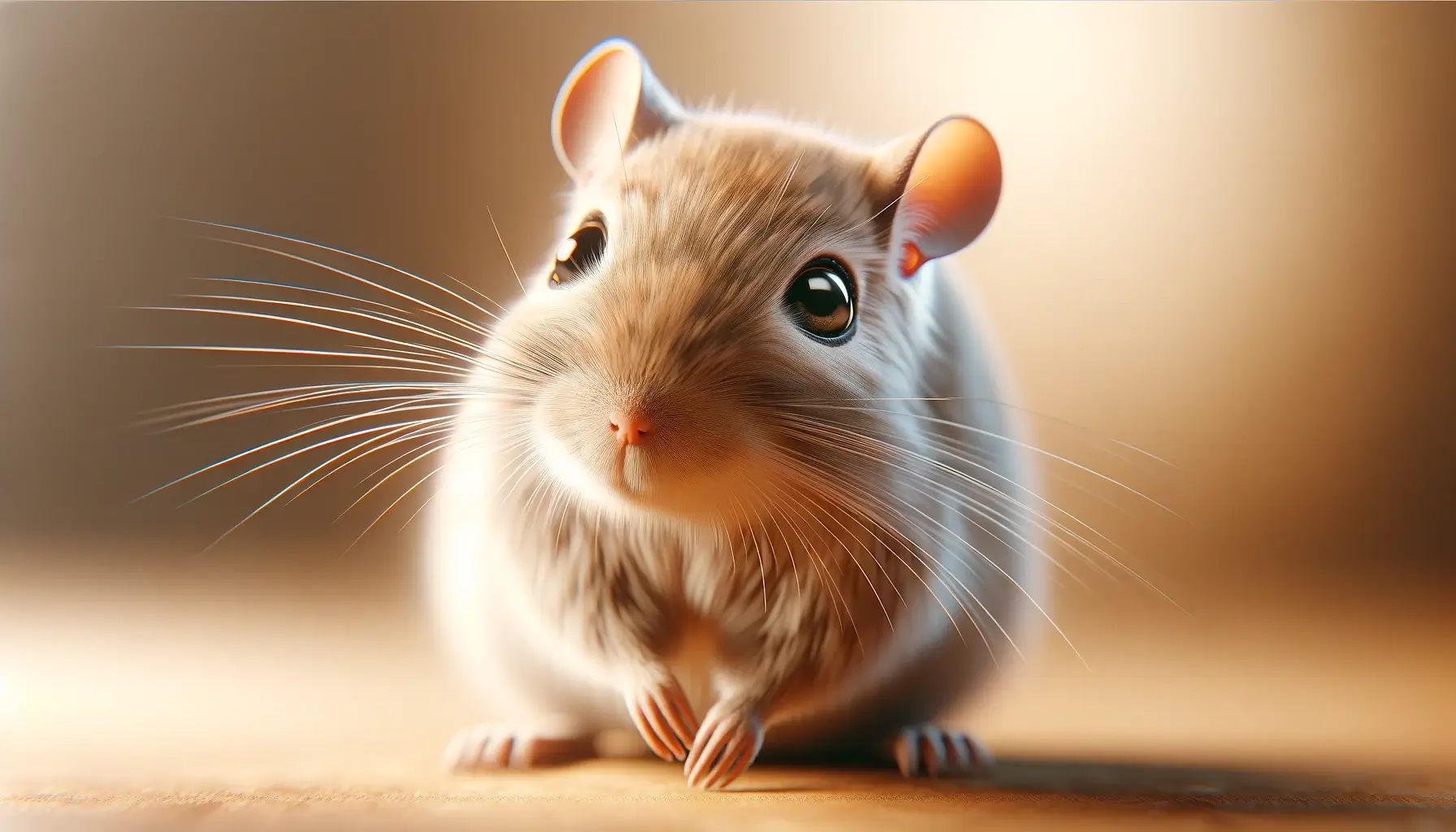Gerbils are delightful pets, known for their playful nature and curious behaviors. However, gerbil owners may sometimes notice their furry friend developing a concerning symptom: a head tilt.
This condition, while alarming, is a sign that your gerbil may be experiencing health issues that require attention. Understanding the symptoms and causes of head tilt in gerbils is crucial for providing the best care for your pet.
Recognizing the Symptoms of Head Tilt in Gerbils
Observing your gerbil’s behavior and physical condition closely can help you identify the onset of head tilt. Here are some key symptoms to watch for:
- Difficulty Walking Straight: Gerbils with head tilt may exhibit unusual walking patterns, such as moving in circles or failing to walk in a straight line. This is due to the disorientation and balance issues associated with the condition.
- Unusual Head Position: One of the most noticeable signs of head tilt is, unsurprisingly, a tilted head. Your gerbil may hold its head to one side, which can appear suddenly and may vary in severity.
- Loss of Balance: Affected gerbils might seem unsteady on their feet, displaying a lack of coordination. They may stumble or fall over while trying to move, indicating a serious balance disruption.
- Changes in Eating and Drinking Habits: Gerbils with head tilt may struggle to eat or drink due to disorientation or nausea. Watch for any decrease in food or water intake, as this can quickly lead to dehydration or malnutrition.
Common Causes of Head Tilt in Gerbils
Several health issues can lead to a gerbil developing a head tilt. Understanding these causes is the first step toward seeking appropriate treatment:
- Inner Ear Infections: One of the most common reasons for head tilt in gerbils is an infection in the inner ear. These infections can disrupt the gerbil’s balance, leading to the characteristic head tilt.
- Brain Issues or Tumors: Less commonly, head tilt can be a symptom of a more serious condition, such as a tumor or other issues within the brain. These conditions can affect the gerbil’s neurological health, resulting in head tilt.
- Injury or Trauma: Accidents or injuries affecting the head, neck, or ear can also cause a gerbil to develop a head tilt. Such injuries can lead to swelling or damage that disrupts normal balance and orientation.
- Neurological Disorders: Certain neurological disorders can lead to symptoms including head tilt. These may be congenital or develop due to other health issues within the gerbil’s nervous system.
Recognizing the symptoms of head tilt in your gerbil and understanding the potential causes are crucial steps in ensuring your pet receives the care it needs.
If you notice any signs of head tilt, it’s important to consult with a veterinarian experienced in treating small animals like gerbils.
Diagnosis and Treatment for Gerbil Head Tilt

When your gerbil starts showing signs of head tilt, it’s crucial to seek veterinary care promptly. A vet experienced with small animals can provide a proper diagnosis and recommend an effective treatment plan. Here’s what you need to know about diagnosing and treating head tilt in gerbils.
Diagnosis: The First Step to Recovery
Your vet will likely start with a thorough physical examination of your gerbil, paying close attention to its ears, eyes, and neurological health. Diagnostic tests, such as X-rays or MRIs, might be necessary to identify the underlying cause of the head tilt, whether it’s an inner ear infection, a neurological disorder, or something else.
Treatment Options: Tailored to the Cause
- Antibiotics for Infections: If an ear infection is to blame, your vet will prescribe antibiotics. It’s essential to complete the full course of medication, even if your gerbil seems to improve before the medication is finished.
- Supportive Care for Neurological Issues: For conditions like strokes or other neurological disorders, supportive care, including a safe, comfortable habitat and assistance with eating and drinking, may be necessary.
- Surgery for Tumors: In rare cases where a tumor is causing the head tilt, surgery might be an option. Your vet will discuss the risks and potential outcomes with you.
Recovery from head tilt depends on the cause and the gerbil’s overall health. With prompt and proper treatment, many gerbils can enjoy a good quality of life, even if some head tilt remains.
Preventing Head Tilt in Gerbils: Proactive Measures
While not all cases of head tilt can be prevented, there are steps you can take to minimize risks:
- Regular Health Checks: Keep an eye out for any signs of sickness in your gerbil, including changes in behavior or appearance. Early detection is key to effective treatment.
- Maintain a Clean and Safe Environment: Keep your gerbil’s living area clean and free from hazards that could cause injury. Regularly clean and disinfect the habitat to prevent infections.
- Balanced Diet: Ensure your gerbil receives a balanced diet that meets all its nutritional needs, which can help support its overall health and immune system.
Living with a Gerbil with Head Tilt: Adjustments and Care
If your gerbil has been diagnosed with head tilt, you may need to make some adjustments to its care:
- Adjustments in Care: Modify your gerbil’s habitat to make it safer and more comfortable. This might include lowering water and food dishes and removing high platforms to prevent falls.
- Monitoring for Changes: Keep a close eye on your gerbil’s condition. If you notice any worsening of the head tilt or other symptoms, consult your vet promptly.
- Quality of Life Considerations: With the right care, many gerbils with head tilt can lead happy, active lives. Focus on providing a loving, supportive environment for your pet.
FAQs
Can Gerbils Fully Recover from Head Tilt?
Recovery from head tilt largely depends on the underlying cause. If the condition is due to an ear infection and treated early, your gerbil can recover significantly, though a slight tilt may remain.
However, if the head tilt is due to neurological issues or tumors, the outcome may vary, and some gerbils may live with a permanent tilt. Despite this, many gerbils adapt well and continue to lead happy lives.
How Can I Prevent My Gerbil from Getting Head Tilt?
While not all cases of head tilt can be prevented, maintaining a clean, safe living environment and providing a balanced diet can help reduce risks. Regularly check your gerbil for signs of illness and consult a vet promptly if you notice anything unusual.
Avoiding stressful situations and handling your gerbil gently can also minimize the risk of injuries that could lead to head tilt.
What Should I Do if My Gerbil’s Head Tilt Doesn’t Improve with Treatment?
If your gerbil’s head tilt doesn’t improve despite treatment, it’s important to follow up with your vet. They may recommend further diagnostic tests to better understand the issue or adjust the treatment plan based on your gerbil’s response. Continuous care and monitoring are crucial for managing this condition.
Conclusion
Gerbil head tilt can be a concerning symptom for any pet owner, but understanding the condition, its causes, and treatment options can empower you to provide the best care for your furry friend. By recognizing the symptoms early, consulting with a vet promptly, and making necessary adjustments to your gerbil’s care, you can help manage this condition effectively.
Remember, many gerbils with head tilt continue to enjoy a good quality of life with the right support and care. Your love and dedication as a pet owner can make a significant difference in your gerbil’s well-being.
If you have any concerns or notice any changes in your gerbil’s health, don’t hesitate to reach out to a veterinary professional who can guide you through the next steps.











